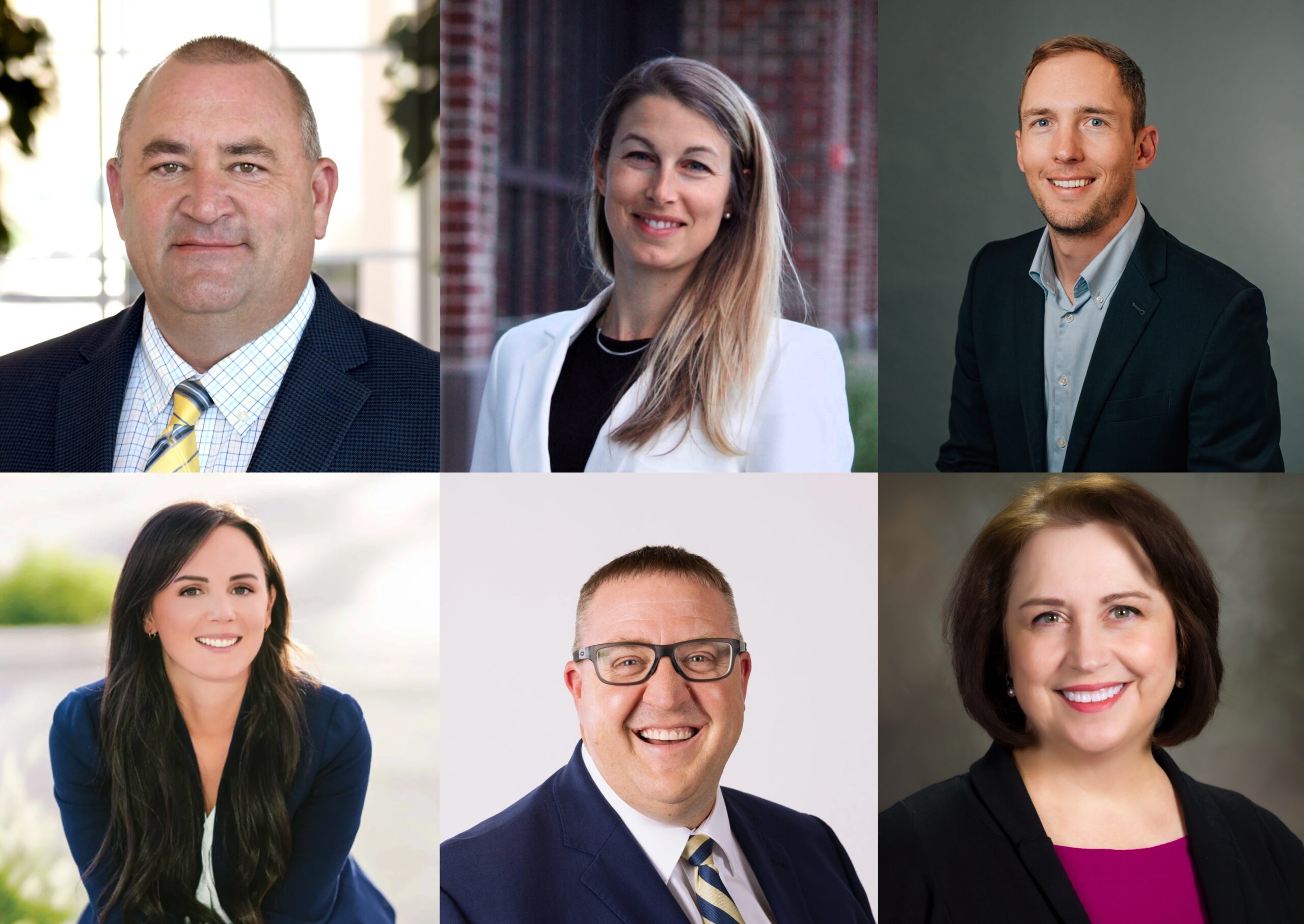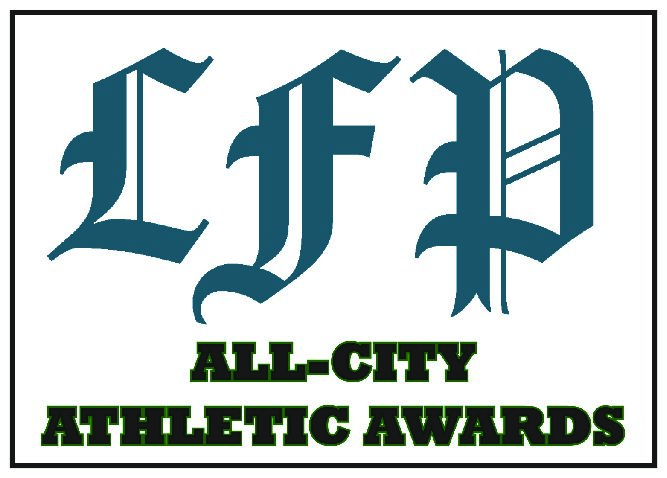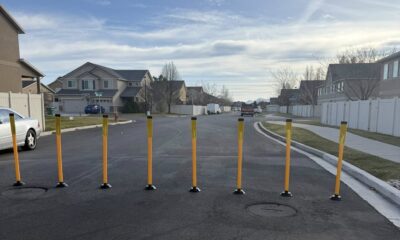Politics & Government
Lehi City General Election: Mayor and City Council candidates profiled
Published
2 months agoon

Matt Hemmert | Lehi Free Press
General election campaigns for the 2025 Lehi City elections have entered the final month, and candidates are making their last pitches to Lehi voters. The Lehi Free Press reached out to the Lehi Mayor and Lehi City Council candidates to expand on the profiles published during the primary campaign. In determining the order in which profiles are listed below, the Lehi Free Press followed the 2024-2025 Master Ballot Position List promulgated by the State of Utah.
Ballots will be mailed to voters the week of October 13 and the General Election is Tuesday, November 4.
Paul Binns, Lehi Mayoral Candidate
What did you learn during your primary campaign that was unexpected? Has that changed your approach or position on an issue?
During the primary, I was surprised by how many residents felt unheard by city hall. Many told me their feedback on development or city projects seemed to disappear without a trace. That showed me the problem isn’t just policy; it’s trust and transparency.
The experience didn’t change my positions, but it reinforced my commitment to openness and accountability. If elected, I’ll hold regular town halls so residents can share feedback year-round, not just during elections. Lehi is full of smart, caring people; city leadership should listen to them all the time.
Do you think that the city should deny all development applications that ask for more density than the subject property’s current zoning? Why or why not?
I don’t believe the city should automatically deny every higher density request, but we can’t keep approving projects without fixing the infrastructure problems they cause. Growth must make sense for more than just developers.
Before approving any zoning change, we need clear evidence that roads, schools, and utilities can handle it. Developers should help pay for the roads, parks, and traffic improvements their projects require. It’s not the job of the city government to make sure every development “pencils out.”
Too often, the city bends its rules to help developers increase profits. I hear residents’ frustration and will work to bring balance and fairness back to the process. Growth should enhance our community, not strain it.
Do you believe the city has coordinated well with UDOT and neighboring cities on pass-through traffic issues? If not, what would you do differently?
Lehi hasn’t coordinated well with UDOT or neighboring cities on traffic from the west. We’ve become a bottleneck for Eagle Mountain and Saratoga Springs, and leadership has been too reactive.
Flex Lanes on Pioneer Crossing will help, but they’re a temporary fix. Over the last decade, key corridors weren’t preserved for expansion, and that lack of planning caused today’s gridlock.
As mayor, I’ll strengthen partnerships with UDOT, nearby mayors, and residents to create proactive solutions. Lehi shouldn’t be left holding the bag for regional traffic others create. I’ve already started working with other cities to improve coordination.
What has the city done well in the past few years?
Lehi City staff are excellent. From police officers to public works crews, I’ve been impressed with their professionalism and commitment. With the right leadership, we can modernize administration, improve transparency, and ensure residents remain our top priority.
Lehi’s parks, trails, and water conservation programs are bright spots. These are great achievements, but now we must refocus on essentials—roads, safety, and planning to keep up with growth.
What would you like the residents of Lehi to know about you that you didn’t have the opportunity to share in the Lehi Free Press’s previous profile edition or during the primary debate?
I’m an optimist. The more doors I knock, the more convinced I am that Lehi’s greatest strength is its people. Residents love this city, and they deserve a government that listens and leads with integrity.
I’ve spent over 25 years in private business managing budgets, leading teams, and making tough financial decisions without relying on taxpayer money. I also served in local religious leadership, where I learned that every leader brings unique talents and that fresh perspectives keep communities strong.
We need more residents involved in city government. Lehi has doubled in size and is filled with talented, civic-minded people. I’m a husband, father of two daughters, and passionate about youth sports. I’m not a political insider—and that’s my strength. I’ll bring common sense, fiscal discipline, and a resident-first mindset to city hall.
Are there any misconceptions about your candidacy that you’d like to address?
Some assume that because I’m not part of the city establishment, I’m inexperienced or anti-growth. The opposite is true. My private sector experience gives me real world accountability skills the city needs.
I’m pro-growth but only smart growth. That means no more giveaways of prime commercial land for high density projects that strain infrastructure and reduce tax revenue. Housing affordability is real, but the solution isn’t unchecked density. It’s thoughtful, balanced planning that protects property rights and quality of life.
I’m running to serve the people of Lehi not developers, lobbyists, or insiders. Together, we can make Lehi stronger, safer, and more transparent.
Paige Albrecht, Lehi Mayoral Candidate
What did you learn during your primary campaign that was unexpected? Has that changed your approach or position on an issue?
I learned that Lehi has a major trust deficit, both with government and sometimes among neighbors. That mirrors the national tone, but Lehi can choose better. Our behavior matters, especially when tensions run high. When we meet criticism with composure and respond to insults with integrity, we lift the standard for everyone around us. People want leaders who listen and lead with calm consistency. As mayor, I will focus on communication, connection, and compassion, because lasting progress comes when we choose to be builders, not breakers.
Do you think that the city should deny all development applications that ask for more density than the subject property’s current zoning? Why or why not?
Each request must be judged by our General Plan, which we painstakingly updated in 2022 and have followed ever since. We placed higher and lower density zones very strategically, making sure infrastructure will support them and that adjoining neighborhoods aren’t negatively impacted. We have cut Lehi’s projected buildout nearly in half since I joined the Council, in pursuit of balanced, sustainable growth. Any deviation from designated density or land use must be approached with extreme caution, and used only when it fits the surroundings, when it pays for itself, and when the entire community will benefit. Predictability builds trust.
Do you believe the city has coordinated well with UDOT and neighboring cities on pass-through traffic issues? If not, what would you do differently?
We’ve made tremendous and tangible gains, but continued collaboration is critical. As Mayor Pro Tem, I’ve represented Lehi in regional planning meetings with UDOT, MAG, UTA, and Utah County leadership, strengthening relationships and aligning priorities. Our advocacy helped secure a federal appropriation of nearly $2.5 million to study long-term solutions for reducing congestion in Lehi. Construction is now underway to convert 2100 North into a freeway several years ahead of schedule, part of UDOT’s $1.4 billion investment plan for northwest Utah County. We’re finally seeing our fierce advocacy turn into actual construction. Now is not the time to let up.
What has the city done well in the past few years?
Lehi has achieved significant results that residents can see. We have built a new police station, a new fire station, and will soon open a new library and civic building. We launched a city-owned fiber network, opened a regional all-abilities park, and completed a new power generation station. We secured a 900-acre conservation easement to preserve natural habitat, scenic views, and recreational access for the public. Our bond rating is exceptional, reflecting steady leadership and conservative spending. Our budget is balanced, our taxes are low, and our utility rates are among the best in the county. These accomplishments are proof that teamwork and good planning produce tangible success.
What would you like the residents of Lehi to know about you that you didn’t have the opportunity to share in the Lehi Free Press’s previous profile edition or during the primary debate?
Many know my service on the Planning Commission, City Council, and various committees, but I want them to also see the care behind that path. I attended city meetings for years before ever holding office because I wanted to understand how Lehi works and how I could make it better through service. I earned my master’s in public service from UVU in 2023 because even a “temporary” job deserves the qualified leadership. I love this city and believe deeply in its people. My leadership style is collaborative, kind, and rooted in service to others.
What haven’t I shared here yet? I’m a wife and mother, a former special education teacher, a classically trained soprano, a world traveler, a wannabe historian, and a cancer survivor.
Are there any misconceptions about your candidacy that you’d like to address?
I deeply respect anyone willing to run for public office. It takes courage and heart. But I’ve heard three misconceptions about my campaign: that I’m a clone of our current mayor, that I’m “bought,” and that I want to be a full-time mayor to make more money. The truth is simple: I have fresh ideas of my own, and I’m excited to implement them. My vote is not for sale, and my record backs that up. I’m perfectly content to leave the mayoral title and pay unchanged, I’ll just work harder than ever. I’ve pledged to leave my law firm and serve full-time because I believe that effective representation requires elected officials to be in the rooms where decisions are made. I will be there every day, representing Lehi with integrity, focus, and energy.
Emily Lockhart, Lehi City Council Candidate
What did you learn during your primary campaign that was unexpected? Has that changed your approach or position on an issue?
I was surprised by how many small business owners shared their struggles with city regulations. Many residents told me about the complexities of navigating the rules, permits, and licensing requirements, which made it difficult to start, grow, or even maintain a business in Lehi. As I gained a deeper understanding of these concerns, I began working toward solutions that will make it easier for small businesses to thrive. I am focused on creating an environment that supports economic growth, encourages entrepreneurship, and ensures that local businesses can succeed.
Do you think that the city should deny all development applications that ask for more density than the subject property’s current zoning? Why or why not?
I support Lehi’s general plan because it reflects years of community input and provides stability and predictability in how Lehi grows. Every property owner has the right to apply for a change; however, I don’t believe zoning should be changed unless there is a very clear and significant benefit to residents. If a proposal aligns with Lehi’s vision and provides a tangible benefit to the community, it can be considered. If not, it should be denied. Exceptions should be rare, deliberate, and only made when they clearly serve residents’ best interests. As a Planning Commissioner, I have a strong record of upholding the general plan and protecting Lehi neighborhoods.
Do you believe the city has coordinated well with UDOT and neighboring cities on pass-through traffic issues? If not, what would you do differently?
Lehi has done more than any other city in Utah County to address our transportation challenges. We have invested in transportation studies that successfully challenged the UDOT projections, resulting in our regional transportation projects moving up on the prioritization and funding schedules. We cannot let our foot off the gas. Lehi needs experienced leaders who understand transportation funding and know how to secure additional resources for critical projects like the Point of the Mountain Connector to Mountain View Corridor and the expansion of Pony Express Parkway to more than just two lanes. I will work hard to ensure these projects are funded and that our community’s transportation needs are met.
What has the city done well in the past few years?
While there are always opportunities to improve, Lehi City has a lot to be proud of. We’ve been named the safest city in the country for two years in a row, thanks to our amazing police, fire, and emergency teams. Financially, Lehi is in a strong position. We recently earned the highest bond ratings possible because of our well managed finances. Additionally, Lehi is an economic powerhouse in Utah. Our diverse tax base, with significant strength from Silicon Slopes, allows us to provide community services without increasing the tax burden on residents. Lehi is a great place to live, and I am committed to keeping it safe, thriving, and well-managed for all residents.
What would you like the residents of Lehi to know about you that you didn’t have the opportunity to share in the Lehi Free Press’s previous profile edition or during the primary debate?
As a mother of two children, I know how important it is for families to have access to programs and opportunities that help them grow and thrive. I’m focused on strengthening families and making sure our parks, recreation, and arts programs are prioritized. I support the missions of both the Rippy Literacy Center and the Curtis Center, which provide essential services to our families in Lehi. I want to make sure these programs, along with others, have the support they need so Lehi continues to be a safe, vibrant place for families to live, grow, and enjoy life together.
Are there any misconceptions about your candidacy that you’d like to address?
As a current Lehi City Planning Commissioner, I often hear the misconception that the Planning Commission plans the city. That isn’t the case. The role of the Planning Commission is to review development proposals and provide recommendations to the City Council on whether they align with the General Plan and comply with state and local code. Serving on the Planning Commission is an important step because it provides a deep level of understanding of how city and state regulations apply to real issues facing the city. My experience as a Planning Commissioner allows me to effectively serve the residents of Lehi on day one.
Rachel Freeman, Lehi City Council Candidate
What did you learn during your primary campaign that was unexpected? Has that changed your approach or position on an issue?
First, I have been reminded that the people of Lehi are willing to help. Everywhere I go, people are willing to come out on a busy night to talk about our city. On the flip side, I have learned that several challenges we are facing are because leaders have felt “tied” to the state of Utah or UDOT or measures ‘out of their control.” I can see this, however, I believe with more effective communication and stronger relationships, our needs, as well as the State’s needs, can be met equally.
Revisiting a hot-button issue from the primary election: housing density. Do you think that the city should deny all development applications that ask for more density than the subject property’s current zoning? Why or why not?
In short, the answer to this question is no, the city should not deny ALL development applications asking for greater density, but it should be cautious in evaluating each application and its impact on surrounding communities before ever saying yes. This topic is complex, and zoning changes should be deeply considered as to how it affects the surrounding properties, business, traffic, water usage (ERUs), infrastructure, etc. As city council members are representatives of the people of Lehi, I believe existing resident voices should be heard, and their needs be prioritized as much as possible.
Another hot-button issue from the primary election: Lehi’s pass-through traffic issues caused by cities to the west of Lehi. Do you believe the city has coordinated well with UDOT and neighboring cities on pass-through traffic issues? If not, what would you do differently?
I think the leaders have done what they thought was best. I have to believe that. However, going forward, I would do things a bit differently. I have spoken several times with UDOT representatives as well as studied the Transplan50 for Utah County. I think there has been too much time, energy, staffing hours, and taxpayer money spent on studying and promoting the expansion of Clubhouse Drive, which is NOT a true East-West connector. City leaders have continued to push this route despite multiple negative indicators, including: UDOT stopping their environmental impact study leading to a likely No Build recommendation, a huge number of residents who have voiced their concerns about the increases in traffic, and the ruin of the golf course at Thanksgiving Point. Instead, I would focus time, energy, and taxpayer money on a Point of the Mountain connector and/or a north shore freeway to help with East-West traffic.
What has the city done well in the past few years?
The city has done a good job of hiring conscientious, and capable individuals to work for the city. Over the last few months, I have been impressed by the employees in different departments whom I have met with, who are willing to spend time with me and answer questions. There are many city employees to recognize and unfortunately, I know if I start naming them, I will inevitably miss some.
What would you like the residents of Lehi to know about you that you didn’t have the opportunity to share in the Lehi Free Press’s previous profile edition or during the primary debate?
I would love to share more of my why. It started with my Grandpa’s stories of service and sacrifice in World War II. Then, my Dad’s words of wisdom: “Rachel, the more education or opportunities you have, the greater your responsibility to do good in the world.” And that is how I have carved my path: to serve something larger than myself. That is how I will approach my role in city council. As a nurse I have fought to keep people alive, and worked to help prevent such crises in the lives of those who I now see as a nurse practitioner. I see the power of hope, hard work, and helping the one in my own life and in the communities I have served. I have Great Hope for the future of Lehi as we work together with a multiplicity of experience while putting residents’ needs at the forefront.
Are there any misconceptions about your candidacy that you’d like to address?
The only misconception I think might exist is that of inexperience. I have been exposed to the political system through my service in the political caucuses–being first elected a delegate at 19–and I feel my life experiences in health care, motherhood, and volunteerism are valuable assets that can broaden the views of the City Council. I have been involved in city matters as an informed citizen through zoning changes near my home, advocating for traffic calming and safe walking routes near the local schools, and keeping a close eye on the school district split. I want to help all the people of Lehi have a voice.
Jared Peterson, Lehi City Council Candidate
What did you learn during your primary campaign that was unexpected? Has that changed your approach or position on an issue?
It’s been great meeting so many amazing people in our community. Many have shared frustration with city communication when issues arise. Too often, residents are passed from one department to another without finding answers, leaving them to wonder why things were handled a certain way.
This has strengthened my commitment to be accessible and transparent as a city councilman. I know not every issue will be easy to solve, but clear communication builds understanding—and when information flows, trust follows.
City leaders must also show humility when mistakes happen or commitments aren’t met, while residents can offer a little grace. Working together with honesty and respect leads to lasting solutions, rather than ongoing frustration and contention.
Do you think that the city should deny all development applications that ask for more density than the subject property’s current zoning? Why or why not?
I believe the City’s Master Plan should be respected and followed. Properties should remain consistent with the density they are currently zoned for, or as outlined in the Master Plan. When rezoning occurs, it can undermine the expectations of neighboring property owners who made thoughtful decisions and investments based on the existing plan and zoning. Also, there is so much work and thought that goes into the Master Plan and it is the best tool the city has to plan out the future look of the city. I believe it is critical that as decisions are made regarding land use and future planning that we look towards complete buildout of the city. The data available today makes that a possibility.
Do you believe the city has coordinated well with UDOT and neighboring cities on pass-through traffic issues? If not, what would you do differently?
City leadership has made real progress on transportation; 2100 North is finally being completed, flex lanes on Pioneer Crossing are underway, and federal funding has been secured for environmental studies to advance future corridors and freeways.
Still, I understand residents’ frustration with traffic and the feeling that progress isn’t fast enough. These are major regional projects requiring coordination with neighboring cities and state agencies.
With new mayors and councils coming into office, now is the time to align efforts with UDOT, MAG, and state leaders to move projects forward efficiently. I’ve built strong working relationships with leaders in Eagle Mountain, Saratoga Springs, and American Fork, and I’m ready to help lead these collaborations to deliver real transportation solutions for our community.
What has the city done well in the past few years?
The city has done well in several areas:
• 217 acres of parks were completed, including Family Park (Phase 1) and Holbrook Farms Park.
• 1,030 acres of natural land, including Traverse Mountain Open Space, were preserved for public use.
• Lehi was ranked the Safest Suburb of 2025 by SmartAsset.
• The city earned a AAA rating from Fitch and AA1 from Moody’s—proof of strong fiscal management and responsible budgeting.
What would you like the residents of Lehi to know about you that you didn’t have the opportunity to share in the Lehi Free Press’s previous profile edition or during the primary debate?
Professionally, I’ve spent three decades in the banking industry and currently manage Central Bank’s Lehi Main Street office. This experience has given me a solid understanding of finance, budgeting, project management, and the vital role small businesses play in our community.
For nearly 30 years, I’ve served Lehi in leadership roles that honor our past while preparing for our future. As a longtime board member of the Lehi Round-Up Rodeo, I’ve helped preserve one of our city’s most cherished traditions. As Chair of the Historic Preservation Committee, I’ve worked to protect the places and stories that define Lehi’s identity. Serving on the Planning Commission has deepened my understanding of property rights, land use, and how thoughtful zoning supports safety, livability, and balanced growth.
Are there any misconceptions about your candidacy that you’d like to address?
I’m not aware of any major misconceptions about my candidacy. There will always be people sharing opinions online, but arguing on social media doesn’t solve anything. I’d rather spend my time meeting face-to-face with residents who have questions or concerns. Through this campaign, I’ve met many incredible people, listened to their experiences, and gained a deeper understanding of our city’s challenges. It’s strengthened my commitment to serve and truly represent the people of Lehi.
James Harrison, Lehi City Council Candidate
What did you learn during your primary campaign that was unexpected? Has that changed your approach or position on an issue?
What surprised me most was how strongly residents across Lehi share the same concerns I do, especially about overdevelopment and the lack of infrastructure to support it. I quickly realized these are not isolated frustrations; they are citywide. I also learned how urgently we must fix our broken city code and improve transparency in government. City staff will tell you directly how unclear and inconsistent codes create loopholes and unfair enforcement. Transparency problems compound that. City business must be an open book, and residents should have timely access to the same information as elected officials.
Do you think that the city should deny all development applications that ask for more density than the subject property’s current zoning? Why or why not?
Our city’s success should be measured by livability for current residents, not how many people we can cram within city limits. Property owners can request rezoning, but it should never be automatic. Zoning exists to protect rights, and Lehi has already exceeded a healthy balance of high-density housing. Infrastructure, police staffing, and water supply are all under strain. Traffic is worsening, water tables are dropping, and taxes are rising. We must slow down and bring in new ideas.
One major concern is the proposed SHAR plan, which would add a zoning layer allowing developers to divide larger lots into smaller parcels for “affordable” housing priced around half a million dollars. This would alter Lehi’s character, increase density, and create government-enforced price controls. If approved, single-family neighborhoods could see lots split up to cram in more homes. Some candidates support SHAR, but I strongly oppose it.
Do you believe the city has coordinated well with UDOT and neighboring cities on pass-through traffic issues? If not, what would you do differently?
While 2100 N and Pioneer Crossing will soon have higher capacity, coordination with UDOT and neighboring cities has been poor, something confirmed by officials in those cities. We are unprepared for the current 120,000 residents west of us, and their numbers are projected to grow to 500,000. Lehi must unite with state legislators, UDOT, and nearby cities to address this strategically.
Poor planning has already hurt us. The city declined to acquire additional land along Pioneer Crossing for future expansion, meaning over 200 homes may now face demolition if widening becomes necessary. On local roads, development approvals often fail to consider traffic impacts. We need foresight, not afterthought, in city hall.
What has the city done well in the past few years?
Our Fire and Police Departments are exceptional. LFD is fully staffed, and LPD continues to deliver excellent service despite shortages. Both departments’ leaders are recognized statewide for their professionalism. I am also pleased to see the new Smith’s on 2100 N, which will boost sales tax revenue and convenience for residents. Finally, the Lehi Roundup remains a cornerstone of our community identity. I would like to see continued investment to ensure its long-term success.
What would you like the residents of Lehi to know about you that you didn’t have the opportunity to share in the Lehi Free Press’s previous profile edition or during the primary debate?
I am focused on solving problems, not building a political career. I plan to serve no more than two terms. The longer someone serves, the easier it is to develop blind spots. Elected officials are public servants, not masters, and Lehi needs that mindset restored at city hall.
Are there any misconceptions about your candidacy that you’d like to address?
I pledged early not to take donations from developers, and I have kept that pledge. To be clear: I respect developers; many are great contributors to our city’s economy. But elected officials must remain impartial. Too many commercial zones have been converted to high-density housing at developers’ requests, cutting future sales tax revenue and shifting the burden to homeowners. Transparency in campaign contributions matters because it shows who influences candidates’ campaigns. I represent Lehi residents, not special interests. If we want change, we need new voices and fresh perspectives.
The Lehi Free Press invites the public to its General Election Candidate Debate on Wednesday, October 15, at 6 p.m. at Willow Creek Middle School (2275 W 300 N, Lehi). The debate will also be live-streamed; please visit the Lehi Free Press website and Facebook page for livestreaming and other additional information.

You may like
-


Pioneer girls drop three to tough teams in hoops
-


Give a piece of Lehi from the Lehi Historical Society gift shop
-


Students, Jazz Bear team up for annual holiday shopping event
-


The Ruth’s “Charlie and the Chocolate Factory” a whimsical treat
-


Lehi Free Press
-


UCHD confirms new measles case in Utah County
-


Barriers near 2100 West cause confusion for Lehi residents
-


Lehi to host national hoops showcase
-


Pioneer boys begin with tough schedule
-


Falcon boys make promising start

